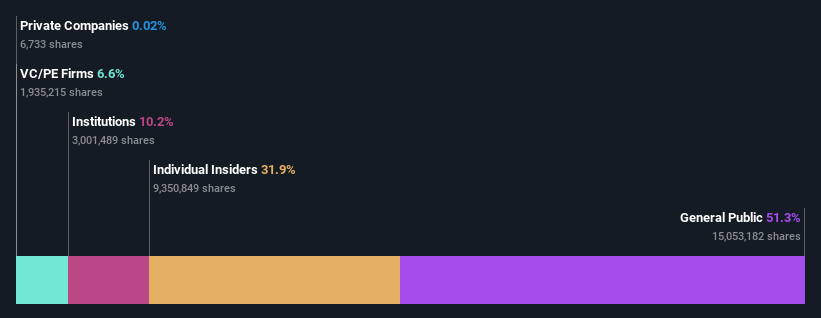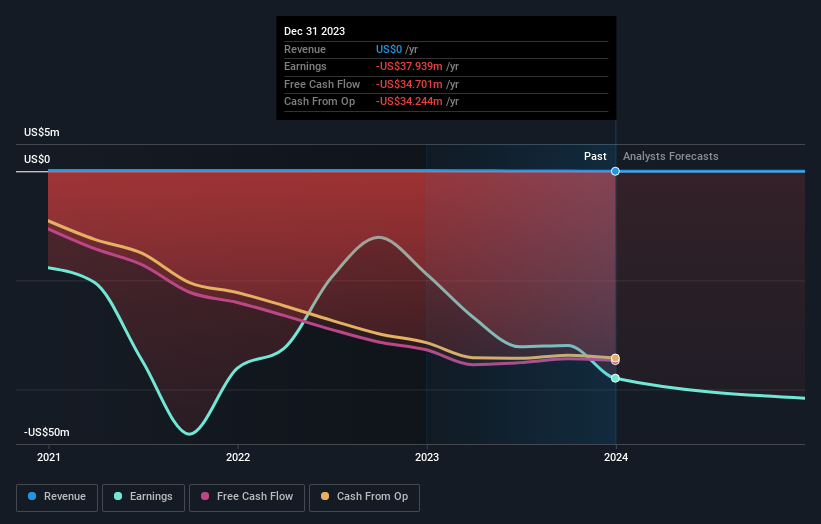Key Insights
-
The considerable ownership by retail investors in Candel Therapeutics indicates that they collectively have a greater say in management and business strategy
-
A total of 25 investors have a majority stake in the company with 48% ownership
To get a sense of who is truly in control of Candel Therapeutics, Inc. (NASDAQ:CADL), it is important to understand the ownership structure of the business. We can see that retail investors own the lion’s share in the company with 51% ownership. In other words, the group stands to gain the most (or lose the most) from their investment into the company.
While retail investors were the group that reaped the most benefits after last week’s 320% price gain, insiders also received a 32% cut.
In the chart below, we zoom in on the different ownership groups of Candel Therapeutics.
Check out our latest analysis for Candel Therapeutics
What Does The Institutional Ownership Tell Us About Candel Therapeutics?
Institutional investors commonly compare their own returns to the returns of a commonly followed index. So they generally do consider buying larger companies that are included in the relevant benchmark index.
We can see that Candel Therapeutics does have institutional investors; and they hold a good portion of the company’s stock. This suggests some credibility amongst professional investors. But we can’t rely on that fact alone since institutions make bad investments sometimes, just like everyone does. If multiple institutions change their view on a stock at the same time, you could see the share price drop fast. It’s therefore worth looking at Candel Therapeutics’ earnings history below. Of course, the future is what really matters.
Candel Therapeutics is not owned by hedge funds. From our data, we infer that the largest shareholder is Estuardo Aguilar-Cordova (who also holds the title of Top Key Executive) with 11% of shares outstanding. Its usually considered a good sign when insiders own a significant number of shares in the company, and in this case, we’re glad to see a company insider play the role of a key stakeholder. With 10% and 7.9% of the shares outstanding respectively, Laura Aguilar and Paul Manning are the second and third largest shareholders. Interestingly, the third-largest shareholder, Paul Manning is also a Chairman of the Board, again, indicating strong insider ownership amongst the company’s top shareholders.
Our studies suggest that the top 25 shareholders collectively control less than half of the company’s shares, meaning that the company’s shares are widely disseminated and there is no dominant shareholder.
While it makes sense to study institutional ownership data for a company, it also makes sense to study analyst sentiments to know which way the wind is blowing. While there is some analyst coverage, the company is probably not widely covered. So it could gain more attention, down the track.
Insider Ownership Of Candel Therapeutics
The definition of an insider can differ slightly between different countries, but members of the board of directors always count. Company management run the business, but the CEO will answer to the board, even if he or she is a member of it.
Insider ownership is positive when it signals leadership are thinking like the true owners of the company. However, high insider ownership can also give immense power to a small group within the company. This can be negative in some circumstances.
Our information suggests that insiders maintain a significant holding in Candel Therapeutics, Inc.. Insiders own US$60m worth of shares in the US$188m company. It is great to see insiders so invested in the business. It might be worth checking if those insiders have been buying recently.
General Public Ownership
The general public — including retail investors — own 51% of Candel Therapeutics. This level of ownership gives investors from the wider public some power to sway key policy decisions such as board composition, executive compensation, and the dividend payout ratio.
Private Equity Ownership
With an ownership of 6.6%, private equity firms are in a position to play a role in shaping corporate strategy with a focus on value creation. Sometimes we see private equity stick around for the long term, but generally speaking they have a shorter investment horizon and — as the name suggests — don’t invest in public companies much. After some time they may look to sell and redeploy capital elsewhere.
Next Steps:
It’s always worth thinking about the different groups who own shares in a company. But to understand Candel Therapeutics better, we need to consider many other factors. Like risks, for instance. Every company has them, and we’ve spotted 5 warning signs for Candel Therapeutics (of which 4 shouldn’t be ignored!) you should know about.
If you are like me, you may want to think about whether this company will grow or shrink. Luckily, you can check this free report showing analyst forecasts for its future.
NB: Figures in this article are calculated using data from the last twelve months, which refer to the 12-month period ending on the last date of the month the financial statement is dated. This may not be consistent with full year annual report figures.
Have feedback on this article? Concerned about the content? Get in touch with us directly. Alternatively, email editorial-team (at) simplywallst.com.
This article by Simply Wall St is general in nature. We provide commentary based on historical data and analyst forecasts only using an unbiased methodology and our articles are not intended to be financial advice. It does not constitute a recommendation to buy or sell any stock, and does not take account of your objectives, or your financial situation. We aim to bring you long-term focused analysis driven by fundamental data. Note that our analysis may not factor in the latest price-sensitive company announcements or qualitative material. Simply Wall St has no position in any stocks mentioned.









